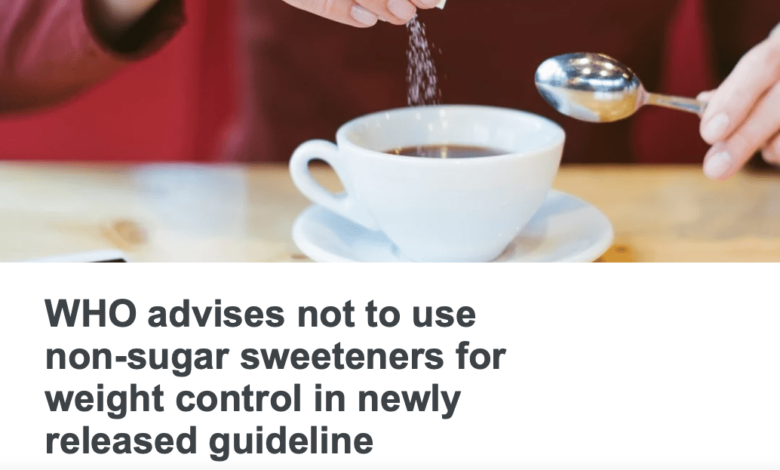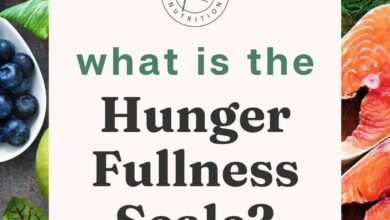The WHO Sweetener Guidelines: Are Sweeteners unhealthy?

Recently, the World Health Organization (WHO) updated their guidelines regarding the use of non-sugar, or non-nutritive, sweeteners (NSS). I know a lot of people have questions about these guidelines, especially because the media has gone wild with them.
What are the WHO guidelines for NNS?
The WHO panel of experts reviewed 238 scientific studies examining health impacts of artificial sweeteners (for example, sucralose) in both adults and children. Of these, 50 were randomized control trials (RCTs), 97 were prospective cohort studies, and 47 were case control studies.
Studies specifically assessing effects of NSS on individuals with diabetes were not included but more on that later.
It may seem irrelevant that I’m breaking down the type of studies that the WHO used in their guidelines, but it’s actually an important factor that we need to take into account when we look at how to interpret the guidelines for our real-life experience.
So, what did the guidelines really say, and does this new research confirm that sweeteners are a poor nutrition choice? Let’s take a look.
A Reminder About Non-Nutritive Sweeteners
Non-nutritive sweeteners, also known as stevia, sucralose, aspartame, and Ace-K are commonly used, low calorie alternatives to sugar. They can be found routinely in diet soda, ultra-processed convenience foods, and in handy packets to be added to food during or after preparation.
These sweeteners mimic the sweetness of sugar, but aren’t easily digestible or absorbable by humans.
While many studies have shown that these sweeteners are safe, there’s still no unanimous consensus among the scientific community, and questions continue to be raised. This is perfectly fine, and all part of normal scientific conversation and evolution.
Because there have been so many studies done to date, and the use of these products is becoming more and more common commercially, the WHO felt it was time to update their guidelines.
I have written about NSS in the form of diet soda, sucralose and gut health, NSS and weight gain, and cancer risk.
The WHO performed a very thorough review, including studies from around the world, using many different types of NSS, and in different groups of people (healthy, illness, etc.).
Here are the types of studies that the WHO used in their review:
WHO sweetener guidelines: randomized controlled trials
A RCT is one where participants are randomly assigned between two (or more) groups. One group usually gets an ‘intervention’ – aka the drug or product or lifestyle program of interest, while the other group gets a ‘control’. Sometimes the control is nothing, sometimes it’s a placebo, and sometimes they get a different intervention.
The idea of this randomized process is to reduce the probability that differences between groups are due to chance, or biases that can occur when selecting patients for studies.
While RCTs have their issues (mostly that they’re lengthy and costly), and they may not be well designed or mimic real-world conditions, the ones that are done well are what we consider the gold standard in scientific evidence. It’s the closest we can come to being able to say one ‘intervention’ is better than something else.
Further, the WHO’s nutrition guidance expert advisory group used a meta-analysis to summarize findings. This is a statistical tool to pool data from many different trials in an attempt to increase the ‘power’ or certainty of a finding. If you find a pattern in 50 people, you may want to test it in 5000 people to make sure it’s real!
The WHO examined these types of studies to answer the following questions:
1) Can NSS help with weight loss/body fat?
2) Can NSS alter eating behavior?
What Did They Find?
Regarding body weight:
Adding NSS to the diet compared with a placebo, and adding NSS to the diet compared with sugars (either NSS replacing sugars or both NSS and sugars being added to the diet in separate arms of a trial), both resulted in decreases in body weight and BMI, with the largest effects when NSS were compared with sugars.
In other words, replacing sugar with NSS resulted in weight loss.
Eating Behavior:
Those consuming NSS had significantly reduced daily energy intake (–569 kJ) and daily sugars intake (–38.4 g). In subgroup analyses, a reduction in energy intake was only observed when NSS were compared with sugars; energy intake was not reduced when NSS were compared with placebo or water.
In other words, replacing sugar with NSS reduced caloric intake AND sugar intake, but when NSS were compared to water energy intake was not reduced. Replacing sugar with NSS may reduce your calorie intake, but replacing WATER with NSS won’t make a caloric difference.
This isn’t exactly a groundbreaking conclusion.
Out of the 238 studies that the WHO used, only 4 of those studies looked at the replacement of sugar-sweetened beverages with NSS-sweetened ones. These showed that people who drank the diet drinks did lose some weight, but their BMIs were not meaningfully changed.
Regarding the duration of the RCTs they assessed, “the majority of RCTs assessing NSS lasted 3 months or less, and the small number that lasted more than 3 months gave inconsistent results. Of these, only one trial lasted longer than 18 months”.
Not exactly a good assessment of long-term effects.

One problem with meta-analyses is that the statistical result you get (NSS are helpful or not helpful) is only as good as the studies you put into it. When the RCT’s have limitations, like very short time periods, these concerns can get lost in the headline grabbing message.
It’s also important to note that the eating patterns in the RCTs were often tightly controlled, monitored, provided with additional help in the form of coaching or dietitian advice, and financially supported. All these factors can make the studies not indicative of real-world eating. You might eat differently if you had someone waiting for a report (or even rummaging through your garbage to see what you actually ate!).
In the real world, NSS would likely be consumed in complex ways, making them more difficult to study.
On the other hand, plenty of recent data (here) (here) (here) (here) suggests that NNS actually do help with weight loss when used to replace sugar (and are safe, too).
WHO sweetener guidelines: cohort studies
The review also included cohort studies, which are often large studies that follow a group of people over a period of time, and track what they eat (and other data about them), while monitoring outcomes of interest, (like weight, diseases, etc.).
These studies can sometimes offer a better real-world perspective, but can have biases, challenges with data collection, and other issues that make it difficult to ‘prove’ things. In nutrition research, this is often the best we have, and are useful in forming hypotheses about our diets, when taken with a grain of salt.
The cohort studies analyzed looked at the following questions:
1) Does use of NSS increase blood sugar (the way real sugar might?)
2) Does NSS use increase the risk of diabetes?
3) Does NSS increase your risk of cardiovascular disease (heart disease, stroke, etc)?
The answer to some of these questions, simply put, is maybe.
The studies suggested that high consumers of NSS (either as additives or in NSS-soda), appeared to have a greater risk of developing SOME health issues (like type 2 diabetes), was higher than low or non-NSS consumers. Correlation doesn’t equal causation though; it doesn’t mean that NSS necessarily caused the problem.
From the guidelines:
“Reverse causation suggests that those already at elevated risk of disease initiated or increased use of NSS because of their risk status, rather than NSS leading to increased risk in otherwise healthy or low-risk individuals. In some studies, those using NSS had a higher prevalence of relevant risk factors.”
This means that people at high risk (maybe overweight or inactive), or with early diabetes may be more likely to be using NSS on the recommendations from doctors, media, or their own perceptions that it’s healthier. It may not be that the NSS causes diabetes, but rather those who develop diabetes are more likely to have switched, and therefore report consuming more. This raises the potential of a statistical ‘lie’.
While there was a statistical association between high NSS use and cerebrovascular disease (ie. Stroke), and risk of type 2 diabetes. Similar associations were NOT found with heart diseases, cancer, or kidney problems. Interestingly, the RCTs did NOT show an association with increased risk of diabetes, making this tricky to interpret.
Further, the weight loss observed in RCTs in those using higher NSS were not seen in cohort studies…So what’s the truth? Are the real-world eating patterns of the cohort studies giving us the truth? Is the controlled environment of an RCT giving us the truth? Could there be something else going on?

WHO Sweetener Recommendations
After all this, the WHO is advising us to cut down on all sweeteners (including sugar), both the ones already present in ultra-processed foods and added by consumers at the point of consumption. Note, the WHO omitted recommending any change for individuals with diabetes, as the use of NSS can be crucial for them to manage the disease.
However, when you read through the guideline PDF provided on the WHO website, you will note the language explaining their recommendation and supporting information is very careful: they state their recommendations are conditional, based on low certainty evidence, in some instances, very low certainty evidence, and inconsistent associations.
Their bottom line on whether NSS lead to a higher risk of bad health effects: “the overall certainty in the available evidence for an effect of NSS intake on outcomes in adults was assessed as low.” AKA, take these results with a grain of salt.
Furthermore, the WHO concedes that there are research gaps identified needing future research in many areas including: “potential long-term effects of NSS use on relevant outcomes in all target populations, including “more robust exposure, and efforts to address reverse causation”, as well as the effects of NSS on oral health, gastrointestinal health, among others. You can read the long list of research gaps and further needs on page 26 of the guideline.
The point of this is simply that the WHO acknowledges there are large gaps in the current research, meaning we shouldn’t be using this updated guideline as reason to panic. Those who use NSS to manage their diets in a positive way can continue without feeling shame or guilt from news articles or posts on social media.
Are sweeteners unhealthy?
My interpretation is that replacing added sugar with NSS may be helpful in reducing your calorie intake, but the less sweeteners – and sugar – consumed, the better.
The studies don’t prove causation, although as with other nutrition research, it’s important to consider when many studies point to the same conclusions. Still, looking at one single food category in peoples’ diets – such as sweeteners – doesn’t tell us the whole story about what these people are also eating.
I think the robust and interesting WHO research unfortunately doesn’t match the message they sent to the general public via the media and has caused unnecessary (or disproportionate) panic.
Of course, you still need the totality of your diet to be varied, balanced, and predominantly whole and minimally processed foods. Yes, ultra-processed foods can fit, but, if possible, they should comprise a relatively small part of your overall intake.
Do people who consume a lot of sweeteners eat fewer plants and more saturated fats and ultra-processed foods? Do those who don’t have a high intake of sweeteners also have a diet that’s full of whole foods? Are they more active?
Health is a product of many factors, only one of which is diet. Social determinants, genetics, and physical and lifestyle activities all play important roles.
It’s important to look at every new piece of information with a critical eye and remember that science is always evolving.
Are sweeteners harmful? To date, we are still lacking high quality evidence that any of the NSS pose harm if consumed in the amounts they’ve been studied.
My recommendations over the years haven’t changed – choose whichever sweetener you prefer and use as little as possible. Teach yourself to expect less ‘sweet.’
Source link
#Sweetener #Guidelines #Sweeteners #unhealthy



